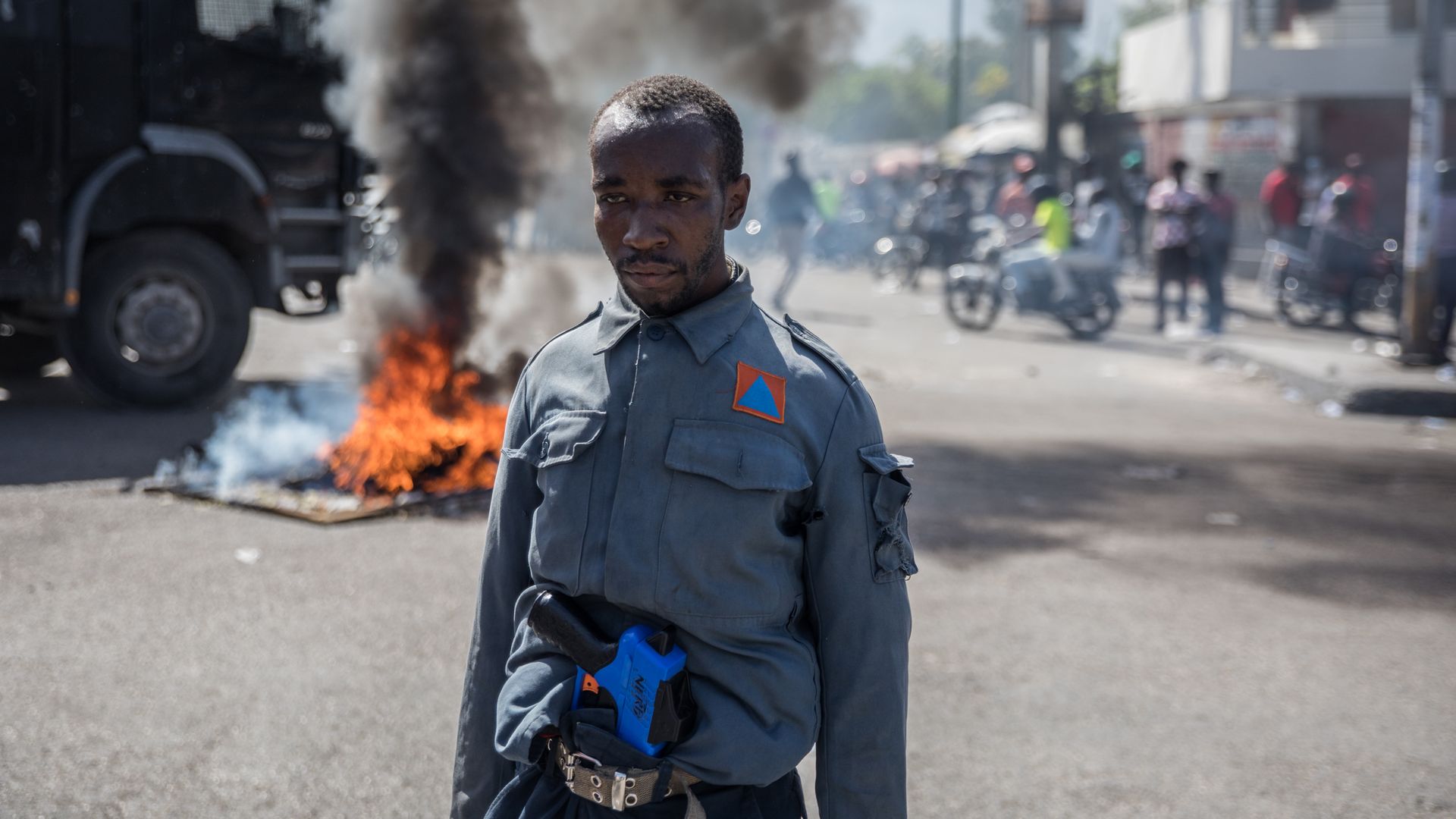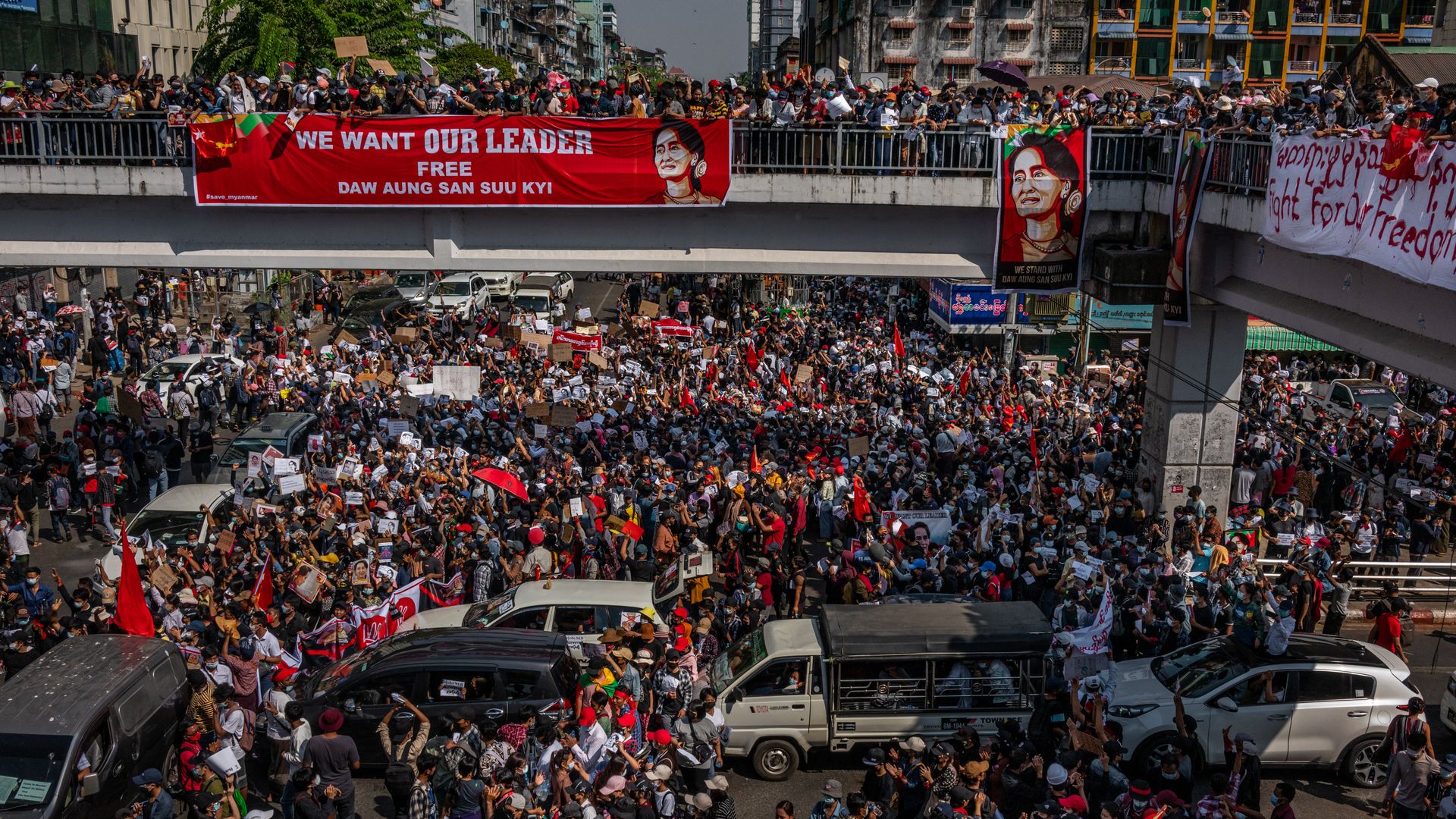| | | | | | | Presented By Raytheon Technologies | | | | Axios World | | By Dave Lawler ·Feb 08, 2021 | | Welcome back to Axios World. - We're taking off tonight from Haiti, swinging through a few troubled democracies and exploring why one country has rejected COVID-19 vaccines (1,770 words, 6½ minutes).
New arrival? Sign up | | | | | | 1 big thing: Coup claims deepen Haiti's political crisis |  | | | Unrest and exhaustion last month in Port-au-Prince. Photo: Valerie Baeriswyl/AFP via Getty. | | | | President Jovenel Moïse of Haiti claims he survived a coup attempt on Sunday. Leading opposition figures say there was no coup attempt — and that Moïse is no longer president. Why it matters: Haiti's prolonged political crisis is coming to a head over the question of whether Moïse's term ended on Sunday or will end on Feb. 7, 2022. This is just the latest flashpoint in a cycle of delayed elections, public frustration and fraying political legitimacy in the impoverished Caribbean nation. Flashback: Moïse's mentor and predecessor, Michel Martelly, left office in February 2016 without an elected successor after the results of a 2015 election were annulled. Moïse, a businessman with no prior political experience, was elected in November 2016 and took office in February 2017. - The opposition argues that, electoral delays aside, the clock on the current five-year presidential term started on Feb. 7, 2016.
- Moïse says it began when he took office — a position backed by the Organization of American States, the UN and, as of Friday, the U.S. State Department.
Driving the news: Moïse appeared on Facebook Live on Sunday to announce the arrests of 23 people, including a supreme court justice, whom he accused of plotting to overthrow and kill him. - The opposition did indeed hope to oust Moïse, but dismisses the idea it intended to do so violently. Whether Moïse's claims were more than political theater remains unclear, at least from Washington.
- "The situation remains murky and we await the results of the police investigation," a State Department spokesperson told Axios.
- Rep. Andy Levin (D-Mich.), meanwhile, said the arrests simply showed Moïse had "escalated his anti-democratic campaign."
- A day earlier, Levin had signed onto a letter urging Secretary of State Tony Blinken to back calls for an immediate political transition in Haiti. The letter, penned by House Foreign Affairs Committee Chair Gregory Meeks (D-N.Y.), revealed a schism between Democrats on the issue.
Between the lines: The State Department spokesperson today reiterated the U.S. position that Moïse's term would end in 2022 while calling on Moïse to schedule elections and all sides to proceed peacefully. State of play: Moïse has been ruling by decree since February 2020 after failing to hold parliamentary elections scheduled for 2019. - Now he says he'll hold a constitutional referendum in April followed by legislative and presidential elections later this year — a timeline Georges Fauriol of the Center for Strategic and International Studies calls "suspiciously short."
- "There are health issues, there are security issues, and the machinery of democracy is for all intents and purposes nonexistent," Fauriol says, citing incomplete voter rolls and the lack of an independent electoral commission.
- Even if the elections are held, the legitimacy of the outcomes will likely be immediately challenged, he adds.
The bottom line: Sunday also marked the anniversary of dictator "Baby Doc" Duvalier fleeing Port-Au-Prince in 1986, heralding the restoration of democracy. - During his Facebook address, Moïse declared, "I am not a dictator." The fact that such a statement needed to be made underscores the fragility of Haitian democracy 35 years later.
|     | | | | | | 2. Checking in on democracy |  | | | Protests in Yangon, Myanmar. Photo: Getty | | | | 1. Myanmar's junta has announced an 8pm–4am curfew and banned gatherings of more than five people in the country's largest cities following three days of large anti-coup protests (see photos). Internet access has also been restricted. - Why it matters: The public support for Aung San Suu Kyi is clear. What's not yet clear is whether the military can intimidate the population into accepting its return to power.
2. Andrés Arauz finished a clear first place in Ecuador's presidential election on Sunday but fell short of the 40% threshold needed to avoid a runoff. - The 36-year-old economist was little-known before being endorsed by Rafael Correa, Ecuador's leftist former president. Correa is now in exile due to corruption charges but retains a hold over the country's politics.
- The race for the second runoff spot is currently too close to call.
- The current president, Lenín Moreno, was also a Correa protege but broke from him and governed as a centrist, attempting unpopular economic reforms.
3. Somalia's opposition parties say they no longer recognize the authority of President Mohamed Abdullahi Mohamed, whose term ended today. - Deadlines to hold elections were missed amid a dispute over their format. The elections were to be indirect, balancing the interests of the country's clans and semi-autonomous states. The path forward is deeply uncertain.
4. Libya has a new unity government, with a three-member presidential council announced on Friday after five days of UN-led talks. - The news follows a ceasefire announced last October in Libya's civil war and attempts to bridge the divide between the government in the capital, Tripoli, and the rebel-held east until elections can be held.
|     | | | | | | 3. Netanyahu on trial |  | | | Netanyahu (R) talks to his lawyers ahead of the hearing. Photo: AFP via Getty | | | | Israeli Prime Minister Benjamin Netanyahu pleaded not guilty in a Jerusalem courtroom to bribery, fraud and breach of trust charges on Monday. Why it matters: Netanyahu's corruption trial resumes 43 days before Israel is due to hold its fourth election in two years, Axios' Barak Ravid writes. Details: Netanyahu stood with his back to the cameras, making every effort not to be photographed inside the courtroom after he and his lawyers entered several minutes before the hearing started. - Netanyahu exited the courtroom after 30 minutes, leaving his lawyer to represent him for the rest of the hearing.
What to watch: Netanyahu hopes to use his trial to mobilize his base ahead of the elections. - On Sunday, Netanyahu released a Trump-like video in which he spoke about a "witch hunt" and "rigged cases."
- In the video, he called on his supporters not to demonstrate in front of the court because of COVID-19 restrictions but said he "appreciates" them.
Between the lines: Netanyahu, his lawyers and political allies had taken every step possible to delay the resumption of the trial, and they were quite successful. Coronavirus lockdowns also caused delays. - The speaker of Israel's parliament, Yariv Levin, issued an unusual statement on Sunday calling on the judges to postpone the testimony phase of the trial until after the elections to avoid perceptions of a political intervention against Netanyahu.
What's next: If this stage isn't postponed, it's sure to dominate the agenda of the campaign. - The judges have said in the past they want to have three hearings a week and that Netanyahu will have to attend most of them.
The big picture: Netanyahu's trial is the primary reason Israel is facing yet another election. - Under a coalition agreement signed last April, he was slated to rotate out of the prime minister's office this November.
- Instead, he'll hope to win a right-wing majority in March, which could then vote to grant him immunity.
|     | | | | | | A message from Raytheon Technologies | | Raytheon Technologies is creating intelligent space technologies | | |  | | | | From missile warning to weather information, Raytheon Technologies is creating space-based technologies that are essential for global commerce, scientific discovery and national security. That's the future of aerospace and defense. Learn more at RTX.com. | | | | | | 4. Tanzania turns down the vaccine |  | | | At the market in Dar es Salaam. Photo: Ericky Boniphace/AFP via Getty | | | | A number of countries around the world have fudged official coronavirus statistics, shared artificially sunny outlooks about the pandemic, or cracked down on reports that counter the official narrative. Zoom in: But no country has taken coronavirus denial to the extent of Tanzania — which is not only denying that it has a single case, but it's also rejecting vaccines. - Even North Korea, which has reported zero cases, is set to receive vaccines from the COVAX initiative. So too Turkmenistan, which is officially COVID-free but will soon launch its vaccination campaign with Russia's Sputnik V.
- President John Magufuli says Tanzania doesn't need vaccines, and that they don't work anyway: "If the white man was able to come up with vaccinations, he should have found a vaccination for AIDS, cancer and TB by now."
- His government has instead recommended herbal remedies, steam treatments, and a ginger and onion smoothie to ward off infection.
Reality check: Magufuli's COVID populism is dangerous for multiple reasons. - Tanzanians are dying. In crowded hospitals, patients on oxygen succumb to what will be officially recorded as "acute pneumonia," The Continent reports.
- The virus crosses borders. The government's decision to refuse vaccines and make any test and trace system all but impossible could be dangerous for Tanzania's neighbors, and potentially the world.
The other side: Doctors and journalists have tried to spread the word about the risks, mostly anonymously due to fear of retribution, and the Catholic church recently raised the alarm. |     | | | | | | 5. Interview: Lisa Curtis on the Trump-Biden handover and the Indo-Pacific |  | | | Photo illustration: Axios Visuals | | | | In her first interview since leaving the National Security Council, where she served from 2017 to 2021 as senior director for South and Central Asia, Lisa Curtis tells Axios' Bethany Allen-Ebrahimian that the Biden administration should put democracy promotion high on its agenda in the Indo-Pacific. Why it matters: The Biden administration has made the Indo-Pacific a top focus of its newly formed National Security Council. That's a continuation from the Trump administration in terms of emphasis, if not necessarily in terms of strategy. Curtis' recommendations for the Biden administration: - Counter the narrative that Chinese regional domination is inevitable.
- Build up alliances and partnerships in the region.
- Balance the U.S. need to protect democracy, as some countries in the region such as Sri Lanka experience backsliding, while avoiding ceding strategic leverage and space to China.
- Develop tools beyond sanctions for promoting democracy. "Relying solely on sanctioning foreign individuals became a blunt instrument and didn't further our broader agenda," said Curtis.
Curtis also said Biden should deepen and broaden cooperation with "the Quad" — a military partnership between Japan, Australia, India and the U.S. — on everything from the post-pandemic economic recovery to a joint response to the coup in Burma. Go deeper |     | | | | | | 6. What I'm watching: America's excess doses |  | | | Illustration: Annelise Capossela/Axios | | | | As regular readers of this newsletter know, I've been thinking a lot about vaccine timelines. So I was interested to see a clip this morning in which former FDA commissioner Scott Gottlieb told CNBC he expects that by the end of March, supply in the U.S. will exceed the demand from all high-priority individuals. - Basically, with the capacity to administer vaccines growing by the day, the J+J vaccine likely coming onto the market and vaccine hesitancy still widespread, the maximum number of shots that could be given each day will exceed the number of arms reaching out to get one.
- At that point, Gottlieb suggests, states should open up vaccination to the general public in order to maximize efficiency.
But that got me thinking about a second point: when the capacity to supply vaccines exceeds overall demand — not the total population, but the number who want a vaccine now. - By that point, perhaps this summer, the U.S. could be freeing up doses for the rest of the world. Or it could end up stockpiling vaccines as distribution slows.
- Given that the U.S. has purchased enough doses to fully vaccinate at least 550 million people — and potentially far more — it could control a significant portion of global supply even after meeting short-term domestic demand.
What to watch: The Biden administration hasn't offered a detailed plan for what it will do with any excess doses. But I hope some smart people are thinking about it. |     | | | | | | 7. Stories we're watching |  | | | An icy Monday in Berlin. Photo: John Macdougall/AFP via Getty | | | - Colombia to offer temporary protective status to Venezuelans
- South Africa vaccine pause is cause for concern
- China approves Sinovac vaccine
- Israel pushes back on ICC war crimes probe
- U.S. to revoke terrorist designation of Yemen's Houthis
- Biden at standstill with Iran over nuclear talks
- Blinken: U.S. will "hold Beijing accountable"
Quoted: "We are getting used to the fact that the European Union are trying to impose unilateral restrictions, illegitimate restrictions and we proceed from the assumption at this stage that the European Union is an unreliable partner." — Russian Foreign Minister Sergey Lavrov in a press conference on Friday with EU foreign policy chief Josep Borrell. Borrell was criticized for failing to push back on the criticism and Russia's broader behavior, including by MEP Guy Verhofstadt who said Borrell had gone to Moscow "just to advertise his weakness." |     | | | | | | A message from Raytheon Technologies | | Raytheon Technologies is creating intelligent space technologies | | |  | | | | From missile warning to weather information, Raytheon Technologies is creating space-based technologies that are essential for global commerce, scientific discovery and national security. That's the future of aerospace and defense. Learn more at RTX.com. | | | | | | Axios thanks our partners for supporting our newsletters.
Sponsorship has no influence on editorial content. Axios, 3100 Clarendon Blvd, Suite 1300, Arlington VA 22201 | | | You received this email because you signed up for newsletters from Axios.
Change your preferences or unsubscribe here. | | | Was this email forwarded to you?
Sign up now to get Axios in your inbox. | | | | Follow Axios on social media:    | | | | | |










No comments:
Post a Comment